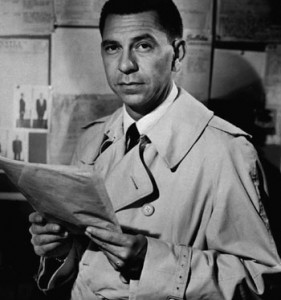We offer a t-shirt that tells us Joe Friday never said “Just the facts, ma’am.” This often lead to the question, what did Joe Friday say and do? In this article, we’ll break down highlights from Sergeant Friday’s appearance in more than 600 television and radio show episodes, two movies, and one novel I’ve read. Some are serious and some are fun, but it’s all in the spirit of celebrating one of the most iconic character of TV’s golden age. For simplicity’s sake, all programs first broadcast on radio will be cited using their radio dates. Programs aired after 1955 will not include a reference to medium unless it’s a book.
General facts:
-Friday and his partner were so in demand, they changed departments often (sometimes every week)
-Friday spent hours waiting for suspects to show up, spent days on fruitless stakeouts and spent entire patrols waiting to catch a criminal.
-While Friday is known for the epic speeches entered into congressional record, he favored the snappy one-liners he delivered nearly every episode.
Friday career highlights and facts:
-Friday joined the force sometime before 1939 (Radio:
07/14/1949) His time on the police force was interrupted by service in World
War II (Radio: 01/05/1950) where he made a friend who subsequently committed a
crime that got him sent to prison.
-He nearly blew up City Hall when he tripped while carrying a bomb in a bucket. Thankfully, it didn’t go off due to a flaw in the wiring.
-Friday lived with his mother (Radio: 05/04/1950) for many years until she
went back East to live with other relatives.
-While undercover, Friday was twice hired to kill a woman.
(Radio: 09/28/1950, TV: November 6, 1967)
-Friday was sent undercover to buy drugs, but when it came time to do the buy to arrest the suppliers, the police didn’t have money to complete the buy. Friday was given a stack of whatever money various captains could get at the last minute, pieces of newspaper, and good wishes that the suppliers wouldn’t insist on examining Friday’s roll too closely. (Radio: 10/26/1950)
-Friday helped a convicted narcotic’s dealer’s kids and helped his wife get a job. This led the convict to give a Friday a lead on a $100,000 narcotics ring. (Radio:01/03/1952)
-After a woman tried to abandon her baby born out of wedlock, Friday and his partner intervened to help her and to gain understanding from her husband. (Original Air Date:04/10/1952)
-Friday once had a girlfriend named Anne who stood by him after he was forced to kill a young man in the line of duty (TV:12/17/1953). However, she was never seen again once he made the fatal relationship move of getting her a stationary set for Christmas despite warnings from Frank Smith. (Radio:12/22/1953)
-Joe Friday and Frank Smith once got into an epic indoor technocolor fist fight against a mob boss’ local hoods. (Dragnet Movie:September 4, 1954)
-Friday once stood silently on a porch for ten minutes in the middle of an investigation while an old man read a long essay about the love of dogs. (Radio:11/16/1954)
-Friday played charades when he was eleven but doesn’t
understand why adults would do that. (Radio: 08/09/1955)
-Friday and Smith went out of their way to make sure an escaped convict doesn’t suspect his wife came to them and told them about him. (Radio:08/09/1955)
-Friday watched the Boston Blackie TV show. (Book: Dragnet: The Case of the Courteous Killer)
-Friday stopped a neo-Nazi from blowing up a school that was integrating. (TV:January 19, 1967)
-Friday failed to sign a receipt for ransom money leading to
a frown and a long conversation with the Captain. (Original Air Date: February
9, 1967)
-Friday wrestled a teenager with a live grenade. (Original
Air Date: September 14, 1967)
-Friday was brought before a shooting board and found justified in shooting a burglar at a laundromat. (Original Air Date: September 21, 1967)
-Friday once took half an hour out of his date to hold a
debate with a drug guru. (Original Air Date: January 11, 1968)
-In the premier of Dragnet 1969, Friday and his partner went on a TV panel show and spent the entire program debating a calm professor and an over-the-top rebel setting the tone for all the excitement in that season. (Original Air Date: September 19, 1968)
-Friday worked to recruit African American police officers, including a character played by O.J. Simpson. (Original Air Date: October 3, 1968)
-Friday and his partner provided support for the LAPD
Command post when Martin Luther King, Jr. was assassinated. (Original Air Date:
October 10, 1968)
-Friday helped the Secret Service with an uneventful visit by the President, since it was Season 3. (Original Air Date: November 14, 1968)
-Friday helped with the training and recruitment of
policewomen. (Original Air Date: November 21, 1968)
-Friday and Gannon went out in the woods and wore casual clothes to have internal police conversations about community relations because once again it was Season 3. (Original Air Date: January 2, 1969)
-Friday and Gannon tracked down a dog that bit a little girl and saved her from having to take an anti-rabies serum she was allergic to. (Original Air Date: March 27, 1969)
-Friday went back to college to get a Master’s Degree in order to become a better police officer. (Original Air Date: March 19, 1970)
-Friday showed a fellow student he knew the difference between cooking spices when a student was openly carrying a bag of marijuana. He claimed, “It’s oregano,” and that he was no different than any other student carrying cooking spices to class in plastic bags. (Original Air Date: March 19, 1970)
-Joe, in making the arrest, strained his friendship with a woman in class he’d been friendly with. Thus she never received a stationery set for Christmas. However, despite losing any chance at a close relationship, Friday was saved from being thrown out of class by a one-eyed lawyer. (Original Air Date: March 19, 1970)
For the purpose of this list, I consider all Dragnet productions featuring Jack Webb to be connected. Two episodes of Dragnet present a combined problem. In the July 10, 1949 radio episode of Dragnet a criminal who Friday and Romero put away 10 years ago comes for a visit. This indicates Friday had been a cop for at least 10 years (when this was interrupted by war service as detailed later in 1950 in the Big Escape.) However in the Dragnet TV episode, the Shooting Board aired on September 21, 1967, Friday stated he’d been on the force twelve years then and contradicted the radio/1950s TV series about the number of times he’d drawn his weapon.
It can be argued that Dragnet 1967 was neither a continuation or a revival of the original radio/TV series but a soft reboot in the same way DC Comics subtly changed the timelines of Batman, Superman, and Wonder Woman to reflect a more recent beginning for each of these iconic characters. This theory is bolstered by the fact Joe Friday ended the original series as a Lieutenant but was back to being a Sergeant in the 1960s series.
However, I’d rather not go for the Dragnet multiverse and just acknowledge the series was not into continuity. The reference to breaking a case ten years previously in 1949 made Joe Friday older than Webb (who had just turned 29) while the reference in 1967 to having been on the force twelve years served to make Friday younger than the forty-seven-year-old Webb.
At any rate, here are a few stand out facts about Joe Friday. If there are any that I stand out to you, please share in the comments.
Other fun quotes. Check out some great Joe Friday/Dragnet quotes at the Internet Archive or Wikiquote.
If you enjoyed this post, you can have new posts about Detective stories and the golden age of radio and television delivered automatically to your Kindle.
This post contains affiliate links, which means that items
purchased from these links may result in a commission being paid to the
author of this post at no extra cost to the purchase


